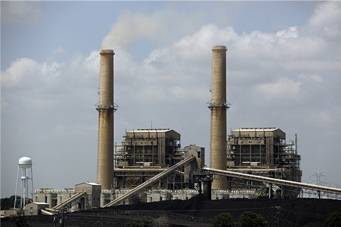© 2014 The Texas Lawbook.
By Natalie Posgate – (September 3) – A federal judge in Waco has ordered one of the nation’s largest environmental organizations to pay $6.4 million in legal fees to Energy Future Holdings Corporation and one of its companies, Luminant Generation Company LLC, for litigating frivolous claims against the Dallas energy company.
“This court finds that plaintiffs’ claims were frivolous, unreasonable, or groundless and thus defendants are entitled to an attorneys’ fees award,” U.S. District Judge Walter Smith wrote about Sierra Club in an order late last week.

Friday’s order follows a three-day bench trial in February in which Judge Smith ruled in favor of Luminant and EFH. Sierra Club had claimed that Luminant’s Big Brown power plant in Fairfield, Texas was exceeding opacity limits and violating particulate matter under the Clean Air Act.
In his March 28 post-trial memorandum opinion and order, Judge Smith stated many reasons for siding with EFH and Luminant. Beyond his decision of the need to award the defendants’ attorneys money, Judge Smith concluded that the public interest would not be served by an injunction on Big Brown.
“Big Brown generates enough electricity to power about 575,000 homes in Texas,” he wrote in his 55-page opinion. “This is much-needed electricity for the state. Electricity is not a convenience; it is a necessity. Threatening the supply of electricity is not in the public interest and is another ground for denial of injunctive relief.”
In a prepared statement, Dr. Al Armendariz of Sierra Club’s Beyond Coal campaign in Texas said Sierra Club “strongly disagrees with the court’s ruling and will appeal immediately,” and that the organization is “confident the court of appeals will reverse the decision.”
“Luminant’s own reports indicated its plants were emitting pollution that exceeded Clean Air Act limits,” he said. “We presented substantial amounts of evidence at trial showing that this pollution could have been prevented by the company, and brought this case in the interest of safeguarding downwind communities.”

Photo credit: Dallas Business Journal
The legal team for Luminant and EFH, which included General Counsel Stacy Doré and Associate General Counsel Daniel Kelly, declined to comment.
Brad Watson, a spokesman for Luminant, commented: “as was proven in trial, Luminant has complied with all environmental requirements, thanks to our hardworking employees who work tirelessly to safely and reliably power Texas.”
In his 17-page ruling, Judge Smith used the Christianburg standard as backing for his opinion. It is a previous U.S. Supreme Court decision that held prevailing defendants may be awarded attorney and expert witness fees if the plaintiff’s claims were “frivolous, unreasonable or groundless, or that the plaintiff continued to litigate after it clearly became so.”
EFH and Luminant argued the Christianburg standard applied in this case, arguing that Sierra Club failed to present any evidence of causation and harm at trial, including its failure to dispute TCEQ’s investigation reports on Big Brown, which determined that no environmental violations occurred, according to Judge Smith’s March 28 opinion.
They also argued that their requested attorneys’ fees were reasonable due to the complexity of the case that required skilled attorneys essentially from out of town to be hired.
Sierra Club disagreed, asserting that the Christianburg standard was not met “because of the danger of implementing hindsight logic, the inherent complexity of the issues of the case, and the reasonable decision to proceed with its claims as the case progressed” and Sierra Club’s claims were not frivolous, unreasonable or without foundation.
It also argued that the requested amount of attorneys’ fees were “grossly excessive,” Judge Smith’s opinion from last week said.
Judge Smith pointed out that levels of frivolity in a lawsuit are made on a case by case basis, and one of the factors include whether the court dismissed the case or held a full trial. He wrote that the claim was dismissed at the summary judgment stage of litigation.
“Plaintiff was aware that Big Brown’s Title V permit exempted it from PM deviations during maintenance, startup, or shutdown activities prior to filing suit, which rendered the claim meritless,” he wrote.
“And at trial, plaintiff failed to prove any causation or injury to its lone standing witness or any other individual,” Judge Smith continued. “Moreover, the one standing witness in the case was not even placed on plaintiff’s witness list, even with the awareness that proving causation and linking the opacity violations at issue to injuries was required in order to prevail.”
Dallas attorneys Bill Dawson and Mike Raiff from Gibson, Dunn & Crutcher led the defense efforts at trial for EFH and Luminant.
Sierra Club’s legal team was primarily from out-of-state, but included local Waco counsel Aubrey Williams of Montez & Williams and Ilan Levin of the Environmental Integrity Project in Austin.
© 2014 The Texas Lawbook. Content of The Texas Lawbook is controlled and protected by specific licensing agreements with our subscribers and under federal copyright laws. Any distribution of this content without the consent of The Texas Lawbook is prohibited.
If you see any inaccuracy in any article in The Texas Lawbook, please contact us. Our goal is content that is 100% true and accurate. Thank you.
